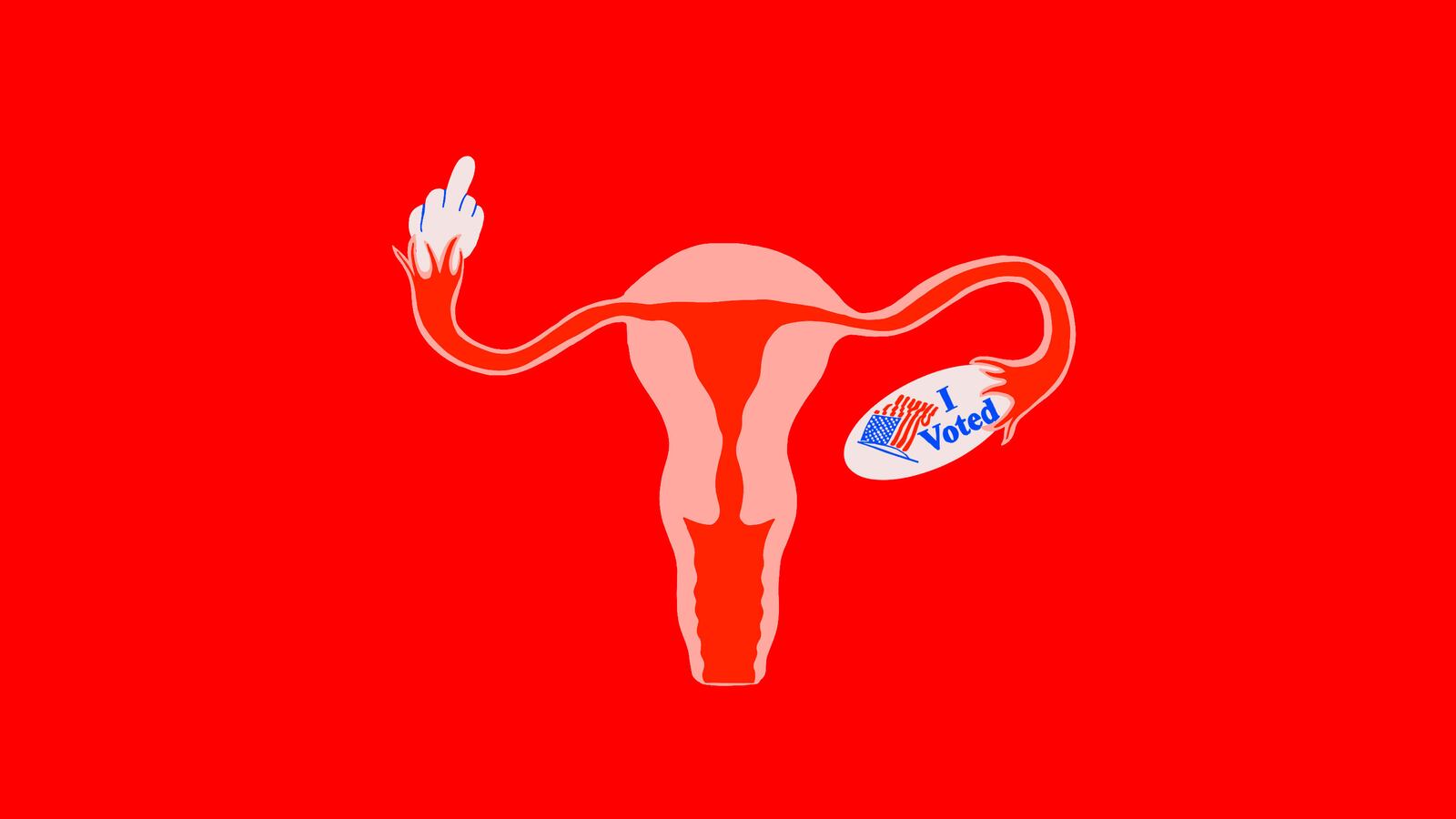Three state elections on Tuesday are offering something invaluable a year before the 2024 contests: the first real glimpse of just how toxic an issue abortion remains for the Republican Party.
In Ohio, Kentucky, and Virginia—all of which are holding fiercely contested elections for statewide offices, legislatures, and ballot initiatives—the results will not only have major implications for abortion access but for how Republicans will navigate this critical issue ahead of 2024.
What happens in these states—two red, one purplish—could push Republicans to one of two conclusions.
One is that abortion rights remain a major liability for the GOP, just like they were in the 2022 midterm elections, which fell months after the Supreme Court decision overturning Roe v. Wade.
The other conclusion—and perhaps the current operating assumption among GOP campaigns leaning away from anti-abortion rights messaging—is that the high court’s decision has faded enough from voters’ minds that they can proceed as usual.
Or, perhaps, there’s a third one.
“I wish it would go away,” a Republican National Committee member told The Daily Beast, requesting anonymity to speak candidly about the “toxic issue” facing the party.
But abortion isn’t going away—partially because Republicans won’t let it.
In Virginia, where all 140 seats in the legislature are on the line, GOP Gov. Glenn Youngkin is trying to sell a bill restricting abortion at 15 weeks—one his camp insists is a “limit” and not “a ban”—as a priority for a Republican-controlled government.
Democratic candidates and groups have made the ban a centerpiece of their messaging, hammering GOP candidates in suburban districts as abortion extremists.
It all has shades of 2022, when Republicans faced widespread bipartisan backlash over the Dobbs v. Jackson decision. Abortion rights advocates have been on a winning streak ever since, but Democrats on the ground are still hearing some of the same things they did before the GOP was caught off-guard on abortion the first time.
“It feels a little Groundhog Day-ish,” Tara Gibson, founder of Roe Your Vote Virginia, a pro-abortion rights PAC in Virginia, told The Daily Beast. Gibson described a disconnect between the pundit sphere and what door-knockers were actually hearing on the ground.
“It kind of makes me a little crazy. It’s abortion,” Gibson said. “That’s what voters care about and that’s what’s going to drive this election.”
The most clear-cut case study will be in Ohio, the only state to vote directly on abortion this fall in a ballot referendum.
There was an ominous preview for Republicans in the August version of Issue 1 that failed, which ultimately became a proxy for abortion rights. (Voters rejected a referendum that would have raised the required level of support for future ballot referendums to pass from 50 percent to 60 percent.)
Ohio’s new version of Issue 1 gives voters the chance to codify abortion, contraception, and miscarriage health-care rights into the state constitution. Republicans managed to replace the term “fetus” with “unborn child” in the summary language voters will see at the ballot box. Critics on the pro-abortion rights side in Ohio have also pointed out that the language does not make any reference to fertility treatment, miscarriage care, or contraception.
And in Kentucky, Democratic Gov. Andy Beshear has been running for re-election as a defender of abortion rights against Republican Attorney General Daniel Cameron, who called his opponent “the abortion candidate” at their Oct. 16 debate.
Tuesday’s elections offer the last, best set of data both parties will have on abortion in competitive races until the 2024 election, where control of the White House, both chambers of Congress, and state capitals nationwide will be up for grabs.
Democrats will be running heavily on the issue, and Republicans have yet to produce a convincing performance in a state where it hasn’t been a central issue since the Dobbs decision.
“They know it’s a horrible issue for us,” the RNC member said of Democrats heading into 2024.
The states in play on Tuesday do not offer a perfect glimpse of the political reality everywhere, but they are about as close to an ideal sample as Republicans could get. If Democrats can win or do very well in very conservative Ohio and Kentucky, as well as swingy Virginia, those running in battleground states will be encouraged.
And if Republicans can put a big win on the board in either of the three states, it will offer the most concrete evidence the party has been able to collect since 2022 on which messaging approach works best for dealing with the aftermath of a long-desired GOP policy victory that has proven broadly unpopular with the public.
Some are already wincing heading into a night of results among an otherwise favorable slate of states, particularly in Virginia under a much-hyped Youngkin.
Out of all three states, the RNC member said the way Republicans have tried to massage the language around restricting abortion in Virginia—”limit” instead of “ban,” “threshold” instead of “cutoff”—sends the wrong signal to voters.
“If they wanna lose elections, then they’ll keep doing that,” the Republican said.
Gibson of the Roe Your Vote Virginia PAC said Virginia Republicans are “trying to make it sound like anything other than [a ban], because our messaging is working.”
Youngkin had already assembled a group of all-Republican lawmakers on the day the Dobbs decision dropped in June 2022 to deliver a “bipartisan consensus on protecting the life of unborn children, especially when they begin to feel pain in the womb,” but since then, public opinion has not gone his way.
Virginia women voters are far more likely to say abortion is an important issue for them compared to 2019, up to 70 percent from 47 percent in a Washington Post poll which asked the same question four years ago. Democrats currently hold the Senate by three seats, while Republicans hold a 52-48 seat advantage in the lower chamber.
In the competitive districts where Democrats like Gibson are focusing their resources, polling from the left-leaning think tank Data For Progress shows voters trust Democrats by a 7 point margin on abortion, with even higher levels of support for Planned Parenthood.
Virginia Senate Democratic Caucus Chair Mamie Locke, who could become the first Black woman to serve as the state’s Senate majority leader, said a coalition of younger and older women have stood out to her the most as she’s worked the swing districts for the candidates she hopes to lead come January.
“Roe v. Wade was decided my freshman year of college, so it’s a right I’ve known for my whole adult life,” Locke told The Daily Beast in an email.
“But for younger people, it’s been the law of the land for their entire lives up until now, and I think it’s even harder for them, and we’re seeing it on the doors,” she continued. “They’re motivated to come out and vote. So we’re seeing the older women who know what it was like to fight for reproductive freedom, and we’re seeing the younger generations who have had something taken away from them.”
In Kentucky, Beshear has been hammering Cameron on the airwaves over abortion.
The state had a trigger law on the books which banned abortion completely after Roe was stuck down, though voters did send a strong signal in 2022 by rejecting a ballot initiative that would have specifically precluded abortion rights from the state constitution.
After an $11 million ad buy late in the summer thanks to the Democratic Governors Association, Beshear has been on the offensive and tied personal stories to his opponent’s policy position. Some of the ads have been devastating, including a pointed spot from a woman who reveals she was raped by her stepfather.
Kentucky has no exceptions for rape or incest in its trigger law.
“To tell a 12-year-old girl she must have the baby of her stepfather who raped her is unthinkable,” Kentuckian Hadley Duvall says in the Beshear ad. “I’m speaking out because women and girls need to have options. Daniel Cameron would give us none.”
Cameron responded to the ad by calling it “disgusting,” while also saying his “heart goes out” to Duvall, and that if the legislature brought him a bill with exceptions, he would sign it.
For Jesse Ferguson, a Virginia Democratic strategist, the whole messaging discussion on abortion has been distracting Republicans from the underlying problem they face in the three key states on Tuesday—likening the challenge to Ford Motor Company trying to sell its ill-fated Pinto in the 1970s.
“In two Trump states and one state with unlimited GOP money,” Ferguson said, “if they can’t sell their abortion position then they might need to realize that they’re trying to sell a Pinto. The problem selling the Pinto wasn’t the slogan, it was that the car would spontaneously catch on fire.”









